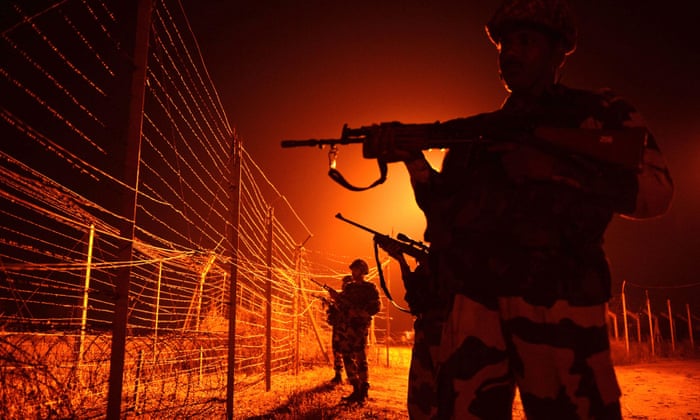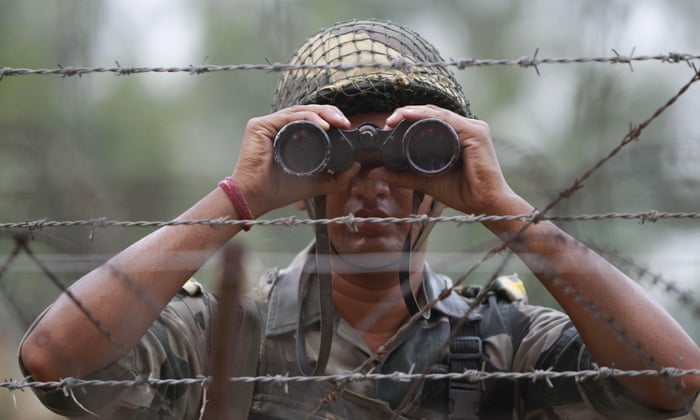A Brief Colonial History Of Ceylon(SriLanka)
Sri Lanka: One Island Two Nations
A Brief Colonial History Of Ceylon(SriLanka)
Sri Lanka: One Island Two Nations
(Full Story)
Search This Blog
Back to 500BC.
==========================
Thiranjala Weerasinghe sj.- One Island Two Nations
?????????????????????????????????????????????????Friday, September 30, 2016
India says troops cross Kashmir border to attack as crisis escalates
Pakistan says two of its soldiers are killed and an Indian soldier captured on its side of contested territory’s border
 Indian
soldiers guard a border fence at an outpost along the line of control
in Suchit-Garh. Photograph: Tauseef Mustafa/AFP/Getty Images
Indian
soldiers guard a border fence at an outpost along the line of control
in Suchit-Garh. Photograph: Tauseef Mustafa/AFP/Getty Images
Elite troops have launched “surgical strikes” on Pakistan-based terrorists in the contested territory of Kashmir, India said on Thursday, in a major escalation of a deepening crisis between the nuclear-armed rivals.
The Indian army said troops conducted multiple nighttime raids across
the line of control (LOC), the ceasefire line agreed in 1972 that
divides the Himalayan region, to attack militants preparing to cross
into Indian-controlled territory.
Pakistan said two of its soldiers had been killed in exchanges of fire, but denied India had made any targeted strikes. Pakistan later
captured an Indian soldier on its side of the border, military
officials from both countries said. An Indian army spokesman said the
soldier had inadvertently crossed the frontier and had nothing to do
with the earlier raids.
It is the first time the Indian army has publicly acknowledged that its
troops have launched raids across the LOC. Lt Gen Ranbir Singh, India’s
director general of military operations, said there were “significant
casualties … to terrorists and those trying to shield them”.
Pakistan dismissed the Indian account as a lie. The army said two
soldiers had been killed and nine injured in cross-border shelling. “The
notion of a surgical strike linked to alleged terrorists’ bases is an
illusion being deliberately generated by India to create false effects.”
Pakistani troops had responded to unprovoked firing from India, it said.
The Pakistani prime minister, Nawaz Sharif, condemned the “unprovoked and naked aggression of Indian forces”.
Senior Indian government sources said special forces had crossed on foot
into Pakistan-controlled territory to strike up to eight hideouts
militants were using to shelter before crossing into Indian-administered
territory.
Intelligence in recent days had shown large numbers of people leaving
training facilities to prepare to cross, sources said. No Indian troops
were killed in the operation and no further attacks are planned, they
said.
The United Nations urged both sides to exercise restraint and resolve
their differences through dialogue. Stephane Dujarric, a UN spokesman,
said officials were following the increase in tensions in Kashmir with
great concern. UN military observers were in contact with both sides to
try to obtain further information, he said.
The violence follows at least nine clashes in two months between Indian
security forces in Kashmir and militants from across the ceasefire line.
Violent protests and a homegrown insurgency have also raged in the
disputed region since July, leading to more than 80 civilian deaths.
Indian officials said the number of incursions across the LOC, which had
declined in the past five years, had surged since the beginning of the
summer’s unrest. People were crossing over in teams of four and showing
evidence of military training, they said.
 An Indian border security force soldier near Jammu in India. Photograph: Channi Anand/AP
An Indian border security force soldier near Jammu in India. Photograph: Channi Anand/AP
The raids were the first military response to an attack on an Indian army outpost in Uri, close to the LOC, on 18 September.India blamed the assault, in which 19 soldiers were killed, on Pakistan-sponsored militants. It provoked calls for India to drop its policy of so-called strategic restraint against its neighbour.
India has launched a diplomatic offensive in the aftermath of the
attack, denouncing Pakistan at the UN as hosting the “Ivy League of
terrorism” and voicing support for separatists in Balochistan, a restive
Pakistani province.
Islamabad says India has provided no evidence the attack was the work of
Pakistan-based militants or the country’s intelligence agencies, which
have long been accused of links to anti-India jihadi groups.
Zahid Hussain, a Pakistani security analyst, describedThursday’s attacks
as a “very serious escalation”. “We have seen firing on the line of
control before, but this is much more dangerous in the context of the
rising tension between the two sides,” he said. “I am not saying that
this could lead to a full state confrontation, but this is how things
start to get out of control.”
India last announced it had conducted cross-border strikes in June 2015,
when it targeted rebel camps in Myanmar in response to an ambush that
killed at least 18 Indian soldiers in the north-eastern state of
Manipur. Delhi described the raid as unprecedented at the time and
signalled similar tactics could be used along its western border with
Pakistan.
On Wednesday, in a sign of deepening Pakistani isolation in the region, India and three other countries announced they would boycot the
forthcoming South Asian Association for Regional Cooperation summit,
which was scheduled to be held in Islamabad in November.
The Indian prime minister, Narendra Modi, has also raised the
possibility of Delhi altering or walking away from a major river-sharing
agreement that permits Pakistan to draw water from three rivers that
flow downstream from India, providing water to 65% of the country’s
landmass.


